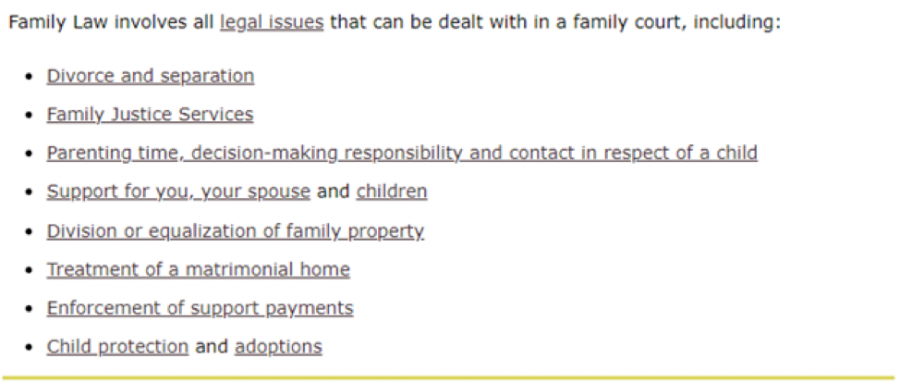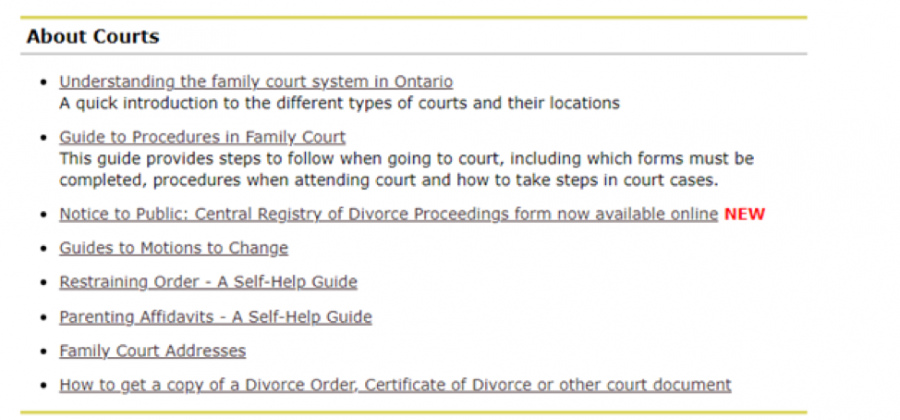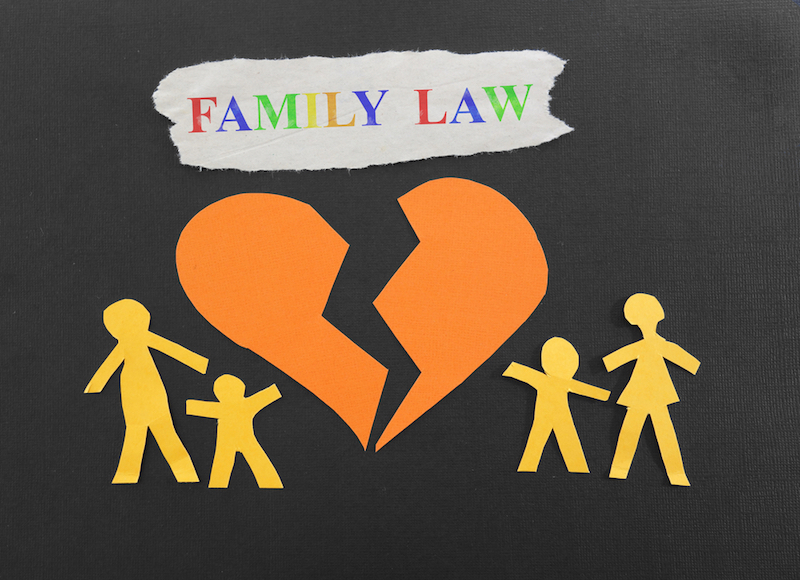Ontario Family Law: Changes don’t make it any less complex to navigate
Content provided by legal writers
On November 20, 2020, the Ontario government received royal assent to Bill 207 – a piece of legislation titled “Moving Ontario Family Law Forward Act, 2020”. In theory, enactment of the bill aimed to make it faster, easier and more cost-effective for individuals and families to address and resolve family legal matters. However, critics of the bill point to the fact that, while largely a positive reform, this, and other pieces of legislation, don’t address some of the core issues around families, separating or divorcing parents, women in abusive relationships, and children facing violence at home.
A Wide River That’s Deeper Than an Ocean
Head on to the website of the Office of the Ontario Attorney General, and you’ll see an 8-point list of what family law involves.

However, what’s laid out there, in that 8-pointed-list, represents just the tip of the iceberg. For those new to the family law system, or those less experienced in dealing with it, there are so many potential obstacles that, unless you have practiced family law for several years, are difficult to comprehend or surmount.
Anyone who thought that the passage of Bill 207 would simplify things, is sadly mistaken. Critics of the Bill say that some of the language, specifically as it pertains to decision-making, leave interpretation wide to misuse or misrepresentation in favor of abusers. While Bill 207 is a long-awaited step in right direction, it does not mitigate all the intricacies of the family law system. In fact, the complexities of Ontario’s family law system run as wide as the widest river, and is deeper than the deepest ocean.
Navigation Made Harder
In Ontario, there are three levels of courts that deal with issues related to family law: The Ontario Court of Justice, the Supreme Court of Justice and the Family Court (a branch of the Superior Court of Justice). There is also the Integrated Domestic Violence Court, which is a branch of the Ontario Court of Justice.
Knowing which of these levels is most appropriate, for your particular family law matter, is critical to navigating the system. The only level, within whose purview lays all family law matters, is the Family Court branch of the Superior Court of Justice. If a parent/spouse/partner lives in a municipality where this court does not have a branch, then the justice seeker must approach the appropriate municipal courthouse to determine where to go to find redress.
Then, there are a set of nearly 40 Family Law Rules that anyone representing family law cases must adhere to in the Family Court of the Superior Court of Justice, the Superior Court of Justice and in the Ontario Court of Justice.

These rules set the tone for everything – from providing legal representation and submitting motions, to presenting evidence; and from protecting the interests of minors and seniors to preparing and submitting affidavits and other legal documentation. Without a comprehensive understanding of these rules, it’s unlikely that legal representatives can deliver justice to victims requiring protection under family law.
Getting Legal Advice
It’s also vital that individuals and families in need understand how to seek legal advice. For qualifying cases, Ontario has “unbundled services” or services that fall under a “limited scope retainer” engagement. While such engagements might cost you less, there is a downside associated with them: Your legal representative helps you with only a portion of your case – which may, depending on case complexity, severely hamper your quest for justice.
Some forms of legal advice are available for individuals requiring immediate assistance of the law. For example, victims of family violence may access such services through community legal clinics, women’s shelters or Family Law Service Centers. Here, again, there are limitations to what victims get: A total of 2-hours of free legal advice.
Victims of sexual abuse in Ontario may qualify for up to 4-hours of free legal advice and consultation from a lawyer. However, there is a prerequisite to receiving such free advice: Victims must complete a request voucher form first, and then email that request to the appropriate center for review and approval before receiving the legal advice they need.
If there are no other family law issues at stake, but the situation requires a restraining order, then justice seekers may qualify for up to six hours of free legal advice and assistance. However, where there are other family law matters at play, it’ll take a legal aid certificate. In some instances, you may be required to sign a “contribution agreement” that binds you to paying back some of your legal aid costs.
Getting Justice for Families
Clearly, understanding and navigating Ontario’s family law system can be challenging, especially for those with limited knowledge or training. Sometimes, even paralegals – who are trained individuals that may provide entry-level legal services – may find themselves overextended when dealing with extremely complex family law situations.
Without robust legal representation at the start, even “routine” family law issues may quickly grow into significant challenges that can cost parents, spouses and entire families – both in terms of money and mental peace. It is in this backdrop that families, and parties grappling with matters related to family law, require broader support when navigating the legal system.
The experts at Toronto Family Lawyers have experience in a broader array of family law matters than most arbitrators, mediators and social workers have. From adoption and child custody and child support, to divorce, division of property and domestic violence, and from inheritances, prenuptial agreements and separation, to succession planning and cohabitation agreements – all the skills, knowledge and expertise required to get justice for families are readily accessible to everyone.
This content is provided by an independent source for informational purposes only and does not contain legal advice. Consult an attorney or financial advisor when making decisions. This information is provided by legal writers and does not reflect the views or opinions of The Daily Sundial editorial staff.










